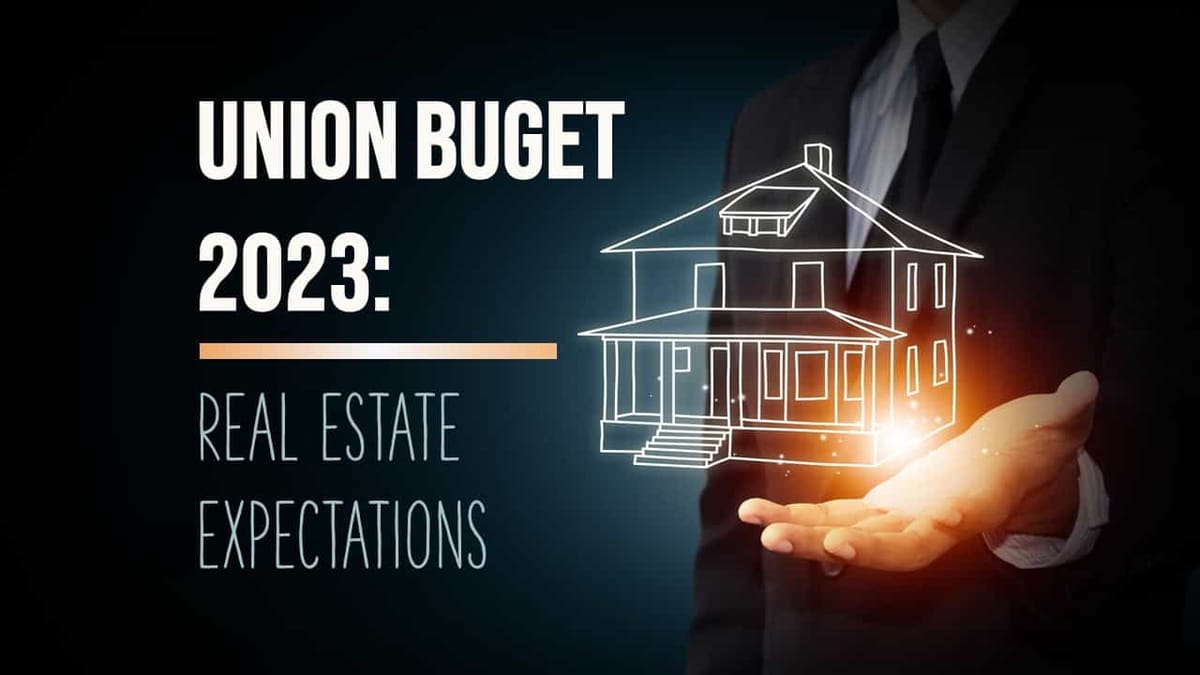Real estate sector has started to pinning its hopes on upcoming budget, presented by FM soon and expects the Union Budget 2023 to play a supportive and enabling role.
Reetu | Jan 23, 2023 |

Budget 2023: Real Estate pinned hopes on Union Budget 2023 for Some Relief
Budget 2023: India’s real estate sector has made a strong recovery in 2022. The year 2022 was one of the most eventful in Indian real estate, with sales recovering in many of the country’s major markets. Both residential sales and commercial leases increased as a result of solid economic expansion and increased demand. However, the sector’s problems are far from over, as it is still dealing with concerns like as high input costs and rising interest rates.
Keeping this in mind, the real estate sector has started to pinning its hopes on the upcoming budget, which will be presented by finance minister Nirmala Sitharaman soon and expects the Union Budget 2023 to play a supportive and enabling role.
Some of the industry’s hopes from Finance Minister Nirmala Sitharaman include a few significant tax breaks and a reduction in stamp duty to help the business.
In fact, despite the prevalent positive attitudes, certain problems must be considered. The pandemic threat is not completely gone. Income declines may also have an impact on demand in the price-sensitive, affordable segment, as well as on real estate development in tier II and III cities.
“The real estate industry has rebounded quickly from the pandemic’s volatility. We believe that the sector should be further stabilised by incorporating significant changes into the Union Budget. Reduced GST, circle rate, and stamp duty would be significant fresh-start improvements that would offer this sector an advantage at the start of the year.” Said Sanchit Bhutani, MD of Bhutani Grandthum.
He further added, “We also anticipate some reductions in GST rates and an increase in SWAMIH to boost the overall amount of the stress fund and make it easier for us to use when we need it. Furthermore, realtors should obtain interest rate subsidies to mitigate the impact of exorbitant inflation rates and accelerate the construction of stalled projects.”
On this the National President of Indian Plumbing Association, Gurmit Singh Arora said, “Stamp duty needs to be reduced. Following the introduction of GST, the industry was burdened, and it is extremely difficult for builders to pass it on to customers. This can be accomplished by offering waivers rather than incentivizing it.”
For one, the sector has long-pending demands such as granting real estate industry status and establishing a single window clearance system. Besides, it is also looking for government incentives that can decrease the prices for first-time home buyers and thus make housing affordable for the masses.
Indian real estate stands on a strong footing with a 50% increase in sales transactions in 2022 compared to the previous calendar year.
A High Profile person said, this positive sentiments will continue in 2023 as well when it backed by a healthy economic outlook, growth in job market and rise in per capita income.
Proactive measures such as raising the cap on house loan interest deductions on income tax returns and lowering capital gains tax can boost consumer spending and hence benefit the sector in the long run. Meanwhile, the GOI should endeavour to open up new lending outlets for the development community.
Given that the inflationary climate is the primary risk for real estate, we anticipate some leniency in terms of GST rate reductions for key raw materials and the reintroduction of input tax credit, which would assist developers in dealing with inflationary pressures.
Real estate employs a large number of casual labourers. Therefore, developers argue that incentivising the sector would have a wider ramification than the numbers imply.
Long-term prospects are still bright. According to NITI Aayog’s predictions, the Indian real estate market will reach a value of $1 trillion by 2030 and represent 13% of India’s GDP by 2025. Further, even though the residential sector has outpaced the demand in the commercial sector, the latter coming up with new models like hybrid spaces is also catching up.
Thus, the finance ministry should consider some of the recommendations made by this industry, in order to lessen the burden.
In case of any Doubt regarding Membership you can mail us at [email protected]
Join Studycafe's WhatsApp Group or Telegram Channel for Latest Updates on Government Job, Sarkari Naukri, Private Jobs, Income Tax, GST, Companies Act, Judgements and CA, CS, ICWA, and MUCH MORE!"